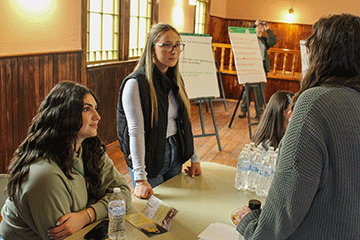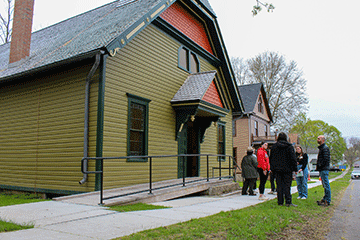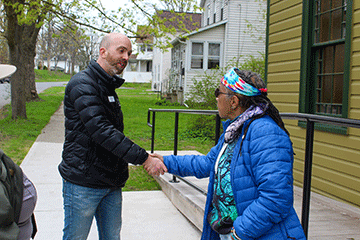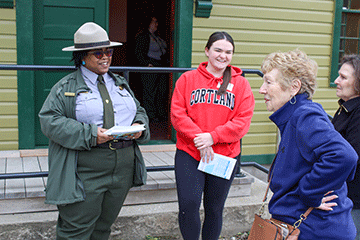Cortland students help preserve American history

04/30/2024
On April 27, 31 SUNY Cortland history students had a unique opportunity to help the National Park Service preserve the history of an American emancipation icon.
Students in Associate History Professor Evan Faulkenbury’s intro to public history course collaborated with the park service and residents of Auburn, N.Y., to host a “History Harvest” to collect artifacts for the newly created Harriet Tubman National Historic Park, set to open in Auburn later this year.
“We try to help students understand that history isn’t just something you read about in a book,” Faulkenbury said. “Every year, I try to have some project where the students make history in the world.”
For this year’s project, the students asked the city’s residents to dig through dresser drawers, scavenge attics and search their closets for memorabilia and items relating to the Thompson Memorial AME Zion Church and its surrounding neighborhood. Memorial AME Zion was Tubman’s church, and the congregation — like Tubman — was involved in the Underground Railroad.
The church and its parish house were purchased by the park service in 2017. The property is undergoing extensive restoration in preparation for its opening later this year.

Unlike museums that receive donated physical artifacts, the Tubman site’s “History Harvest” allowed family heirlooms and personal histories to be shared and recorded without being lost to those who own them.
Submitted items — such as letters, old photographs, church bulletins, memorabilia, etc. — will be scanned or photographed. The originals will be returned to the owners, and the digital copies will be displayed in future museum exhibits at Tubman National Historic Park.
“You don’t get to do this very often,” said Juliana Sparachino, a sophomore dual major in adolescence education and history from New Springville, N.Y. “It’s interesting to see how involved our History Department has been when trying to get students involved with real-life history. You don’t see this happening very often with other colleges.”
Faulkenbury, a SUNY Cortland faculty member since 2016, previously has assigned students in this course to work on projects with the local 1890 House Museum, the Cortland County Historical Society and the university’s archives and special collections housed in Memorial Library.
The creation of the Harriet Tubman National Historic Park about 35 miles northwest of Cortland, presented an irresistible challenge. In 1891, the Thompson Memorial AME Zion Church was built thanks to an impressive fundraising effort among the Auburn community. Tubman herself donated $500.

The congregation of Thompson Memorial used the building for more than a century, leaving the aging facility in 1993 for a newer and more suitable location.
Notably, several members of the congregation had worked as Underground Railroad activists. The site now serves as a reminder that churches nationwide were important locations for freedom seekers, often represented as “stations” on the Underground Railroad.
In 1974, the National Register for Historic Landmarks listed the Thompson Memorial A.M.E. Zion Church. Since the National Park Service acquired the vacant building seven years ago, it has worked to restore it. When the park opens, the church will appear as it did in 1913 for Tubman’s funeral.
Faulkenbury divided his students into six groups, each with six different tasks leading up to April 27. Sparachino’s group, for example, acquired food and beverages from the community for the event. In their extra time, this group helped spruce up the outside of the church.
Another group was tasked with press, social media and marketing for the event. A third group worked with SUNY Cortland Archivist and Instructional Services Librarian Brian Jirout to acquire the needed scanning technology and serve as documentarians of their project for the NPS.
“This project has helped shift my view of history from a broader perspective to a narrower one, focusing on the smaller towns in which history was made,” said Rachel Bouwens, a sophomore dual major in history and adolescence education: social studies and history from Homer, N.Y.

“I hope to be able to, ideally, hear stories about Harriet Tubman’s actions and legacies in the community or stories about the church,” she said.
In 1849, Tubman escaped her plantation in Maryland to Philadelphia with the help of the Underground Railroad, a system of secret routes and safe houses that guided slaves to the North. She would make over a dozen trips back into slave states as a "conductor” of the railroad, leading approximately 70 slaves to freedom and teaching countless others how to escape independently. An icon of freedom, Tubman is set to replace former president, Andrew Jackson on the $20 bill in 2030.
Beyond the noble experience of interacting with American history, the course represented a steppingstone to their futures.
“We’re trying to show that it’s a very versatile degree,” Faulkenbury said. “You can work in public history, in the museum world, at a historic site, or at a non-profit, so it’s just a matter of helping the students think about how they can better sell themselves.”
Even for those who want to teach, like Bouwens, the course and experiences like this impact their views on history and how they’ll teach it.
“I think that this project and the class as a whole will help me as a teacher a lot,” Bouwens said. “The entire point of this class is to discuss how historians can make history interesting for people who don’t like history. This project helps to bring in the local public history aspect, which can help students connect more abstract historical concepts to something they could be familiar with.”
To see more about the project or find out more information, contact the class through Instagram.
Prepared by communications office writing intern Jean-Andre Sassine '23

